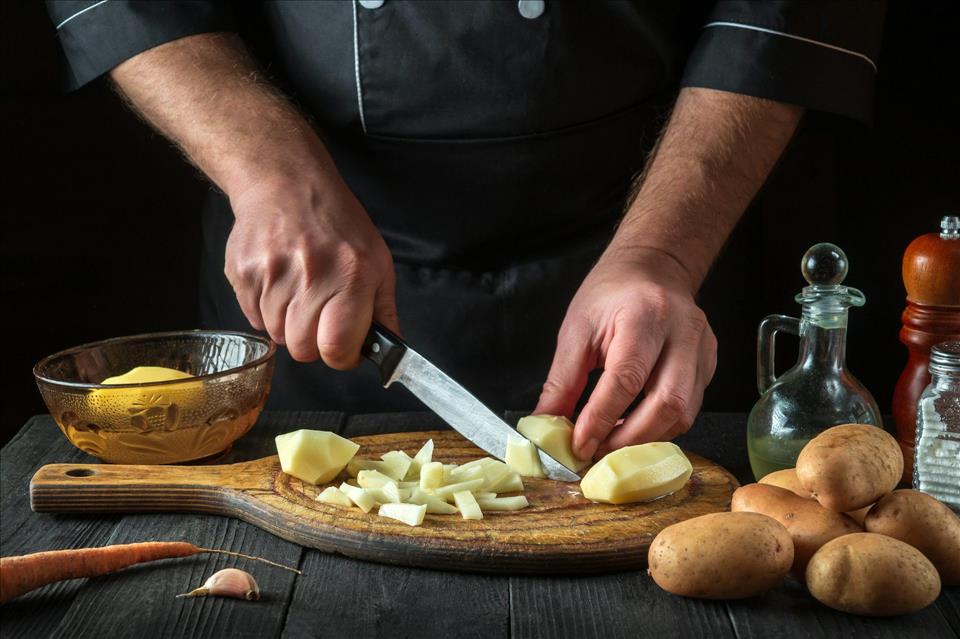
Why Stopping Knife Crime Needs To Start In The Kitchen
Knives are the murder weapon of choice in the UK. And despite sensational headlines about zombie knives and machetes, the most popular knife by far for murder in is the pointed kitchen knife. In England and Wales in the last year, it was used in more than half of murders where the type of knife was known, compared with 4% for zombie knives.
Type of weapon used in homicide by knife or sharp instrument in England & Wales, 2022-23
Data via ONS 2024. Author provided , CC BY
In a new paper published in the journal Crime Science, we propose that the round-tip default needs to be extended to kitchen knives. Not only would the murder rate fall but so too would knife crime generally. And it would also prevent tens of thousands of non-criminal knife injuries at work and in the home. So, we propose phasing pointed-tip knives out over a number of years.
The pointed tip of a kitchen knife is what makes it an attractive, effective murder weapon. Research comparing the harm from stabbing by different knife types (including pointed, round-tip, and serrated or not) found – perhaps not surprisingly – pointed straight-edge knives and pointed serrated knives to be very damaging, while round-tip knives do little or no damage.
There has been significant progress in control of lethal knives in the UK. The Offensive Weapons Act of 2019 made it illegal to possess certain kinds of dangerous knife (such as flick knives) even in private, and banned carrying kitchen knives in public without good reason. In September 2024 , it became illegal to possess or sell zombie-style knives and machetes.
Phasing out pointed-tip kitchen knives, to be replaced by round-tip knives, is a natural extension of this progress and, we argue, would significantly reduce deaths and injuries.
Evidence-based knife crime policyKnife crime in England and Wales increased in the 2010s, according to police crime records, hospital admissions and knife-related homicides. Each almost doubled from 2012-18, before levelling off or declining slightly since then.
Existing anti-knife crime policies are limited at best, with neither various policing efforts nor Violence Reduction Units (in 18 problem areas since 2019) yet to prove effective.
The one thing we know to be effective is weapons control policy, as a way to reduce opportunities for crime. This is clearest in the contrast between gun-related homicides in the US and UK: rates in the US , where policy is based on an unfortunate constitutional right to carry a gun, are dozens of times higher.
Is it feasible to expect knives to change in every kitchen? A few years ago, many readers would have baulked at the notion that fossil-fuelled vehicles could be phased out – a process now well underway in the UK and elsewhere , which provides a model for our proposal of phasing out pointed kitchen knives.
Such a change won't happen overnight, of course, and we propose phases across a number of years – perhaps a decade or longer. An initial consultation period is needed, plus marketing to promote knowledge, purchasing and use of safer knives. Some natural wastage will help, as old knives are replaced by safer ones over time, and time is also needed for manufacturers to adjust.
Incentives and exceptions may be required. Several years of gentle encouragement may be needed for us to get used to the idea. Over time, this can shift to stronger incentives with the ultimate goal of a full ban on pointed-tip knives – that is, the same model we are using for fossil-fuel vehicles.
The manufacturer Viners has created a line of round-tip knives. Viners, CC BY
Some potential criticisms are non-starters. First, there are no culinary drawbacks to round-tip knives, according to cutlery manufacturer Viners, which developed its line of safety knives with the input of 1,700 people .
Second, few offenders would switch to other weapons. Screwdrivers, scissors and other items are less numerous, less available and make inferior weapons. Screwdrivers may be in a garage, shed or elsewhere. The design of scissors does not facilitate stabbing and makes them unwieldy. Bottles are a possibility, but containers at home tend to be plastic or cardboard, and most beer is in cans. Many beer bottles are too large (750ml) or too small (330ml stubbies), plus it takes skill or luck to weaponise a bottle.
This practice of switching weapons is more formally known as“tactical displacement”, and there is extensive theory and evidence showing it is the exception, not the rule, among perpetrators.
Killer kitchen knives should be phased out as dangerous and unnecessary. Round-tip knives are less likely to tempt violence, and less damaging if used. Knife crime in general, and knife carrying, will decline if the nation's weapon of choice is no longer available.

Legal Disclaimer:
MENAFN provides the
information “as is” without warranty of any kind. We do not accept
any responsibility or liability for the accuracy, content, images,
videos, licenses, completeness, legality, or reliability of the information
contained in this article. If you have any complaints or copyright
issues related to this article, kindly contact the provider above.


















Comments
No comment